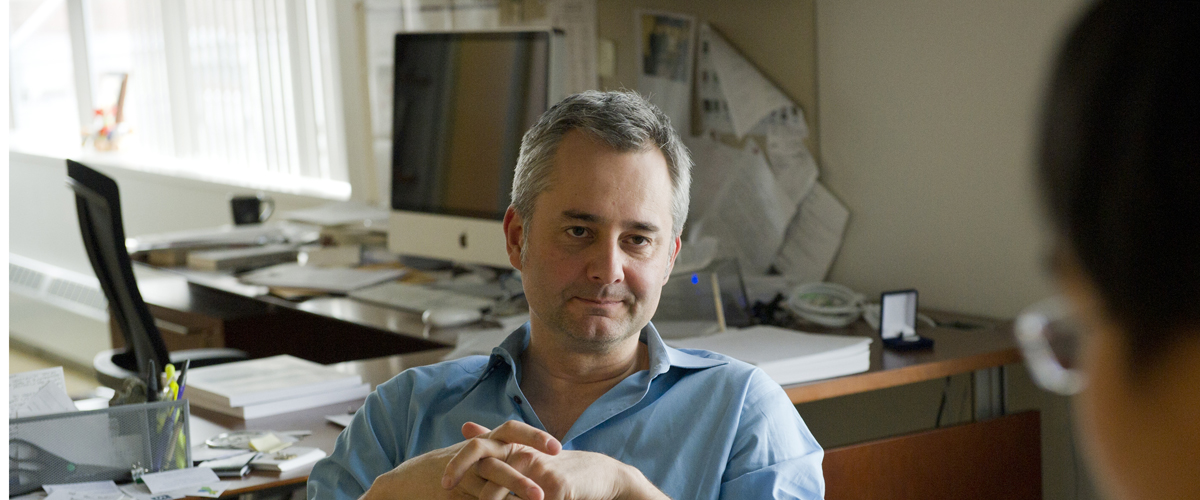by Jason Kornwitz
A growing number of researchers have begun developing creative ways to measure success from a quantitative point of view, from analyzing citation patterns to number-crunching presidential elections.
On Monday, at a daylong conference, more than two dozen economists, physicists, mathematicians, and social scientists convened to discuss the quantitative laws and patterns governing high achievement. The inaugural Science of Success Symposia was hosted by Harvard’s Institute of Quantitative Social Science and organized by Northeastern’s Center for Complex Network Research, which currently focuses on systems biology and social networks.
“We’re trying to mathematically describe and predict what it means to have success and how to achieve it,” said network scientist Albert-László Barabási, Distinguished Professor of Physics and director of the Center for Complex Network Research.
Success, he said, is a collective phenomenon. “In a way,” he explained, “you are successful because others around you believe you are.”
Barabási will continue this discussion as the featured guest on the College of Science’s weekly Twitter chat on Wednesday at noon.
The speakers at Monday’s symposium ranged from experts in network science to journalism. Two Northeastern researchers— Chaoming Song, a research assistant professor of physics, and Nicola Perra, a post-doctoral research associate in the Laboratory for the Modeling of Biological and Socio-technical Systems—presented their work. Perra outlined his framework for mapping and ranking scientific production and consumption around the world and Song discussed the ability to accurately assess the long-term impact of a scientific discovery based on citation patterns.
Brian Uzzi, a professor of leadership at Northwestern University’s Kellogg School of Management, delved into the role of novelty in achieving success. He analyzed more than 17 million papers in the Web of Science database to test the common claim that novel combinations of prior work inspire fresh thinking and innovative solutions to challenging problems. He found papers that inject novelty into otherwise exceptionally conventional combinations of prior work are twice as likely to be among the most highly cited.
“Novelty does lift impact but only when imbedded in high conventionality,” Uzzi explained. “Real innovation pushes along both frontiers simultaneously.”
The phenomenon is not confined to the scientific field. Filmmakers Joel and Ethan Coen injected novelty into their run-of-the-mill screenplay for Blood Simple, Uzzi said, by randomly rearranging scenes and then rewriting the script based on the unusual combinations.
“In the end,” he said, “they came up with something incredible by adding novelty to convention.”
Duncan Watts, a principal researcher at Microsoft, explored the relationship between success and social influence in an artificial music market.
In his oft-referenced 2006 study, Watts and a team of researchers at Columbia University asked some 14,000 subjects to download and then rank 48 songs by little-known indie bands. The researchers found that subjects who received feedback on which songs were listened to and liked the most by other participants tended to favor those songs too. If a few early listeners liked a particular song, it tended to succeed; if they disliked a song, it tended to fail.
“Individual and collective decisions are influenced by the observations of the choices of others,” Watts explained. “The popular songs become more popular and the unpopular become more unpopular.”
“This does not mean success should not be rewarded,” he added, “but suggests that winner take all markets are less meritocratic than they seem.”
Josh Gosfield and Camille Sweeney played the role of conference outlier, taking a qualitative approach to elucidating the secrets to success.
For their book The Art of Doing: How Superachievers Do What They Do and How They Do It So Well, Gosfield and Sweeney interviewed dozens of high achievers, from Emmy award-winning actor Alec Baldwin to Major League Baseball Hall of Fame catcher Yogi Berra.
The most accomplished people, they discovered, share several traits separating them from the rest. For example, of the superachievers they interviewed for their book, all shared a dedication to following their dreams. “If you want to pursue your dream,” said Gosfield, “you shape life around your inspiration. Not the other way around.
“Pursuing a goal requires more time, effort, perseverance, and disappointment than you can ever imagine,” he added.
Many of the superachievers practiced active listening, which Gosfield defined as an “act that puts you in a receptive state to take in knowledge and learn.”
Take Erin Gruwell, the high school teacher who inspired the 2007 film Freedom Writers by encouraging her low-performing students to pen journal entries detailing their struggles.
“Gruwell jettisoned the traditional curriculum and became a student of her students,” Sweeney said. “They showed her their scars and bullet wounds,” Gosfield added. “They told her about their lives of gang related violence and broken homes.”
In closing remarks, David Lazer, an associate professor of political science and computer and information science at Northeastern, challenged the symposium’s speakers to design systems that emphasize quality. In the aftermath of the Boston Marathon bombings, Lazer and his research team developed an application for Android phones to help better understand how people use social networks during times of crisis.
“We want to identify quality rather than amplify the noise,” he told them.

